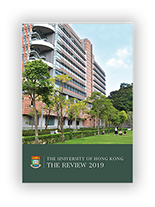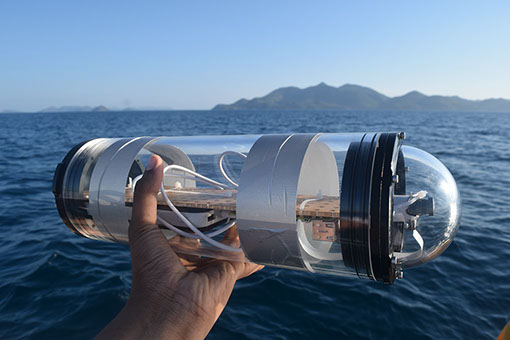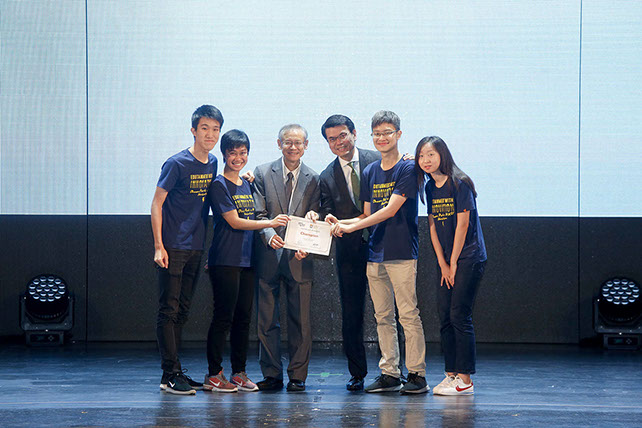Knowledge Exchange and Technology Transfer
2018_%20.png?crc=3873734352)
PDF Version
Past Issues
Vision and Mission
An Extract from
the University’s
Annual Accounts 2018–19
The University Profile
Officers of the University
The Court
Teaching and Learning
Research and Innovation
Knowledge Exchange and
Technology Transfer
Message from the
President and
Vice-Chancellor
E-Book

Students Engaged
Students increasingly are participating in impactful KE projects, either through their own initiative or through faculty- and University-based programmes.
Taking the Plunge
An underwater camera and stand developed by a multidisciplinary team of undergraduate students is being used by scientists in the Philippines to monitor marine life off a remote coral reef.
The students developed the baited remote underwater video (BRUV) surveillance system – a camera that uses far less battery time than conventional cameras because it takes photos every few seconds rather than filming continuously. Team leader Saumya Gupta, a second-year BSc student majoring in Ecology and Biodiversity, pitched the device through emails to organisations around the region and received positive feedback from National Geographic Explorer Dr Alessandro Ponzo and the Large Marine Vertebrates Research Institute Philippines. After communicating with them about their needs, the students also devised a stationary stand for the camera that now sits unobtrusively in the water monitoring the movements, behaviour and population numbers of manta rays.
This was an entirely student-led project and Saumya also recruited the other student members of her team, who come from the Science, Engineering, Architecture and Social Sciences faculties and who have all helped create and test the technology and organise a trip to test and deliver it in the Philippines. The students received funding support from the Gallant Ho Experiential Learning Fund and now hope to interest other parties in their device. “I had wanted to do something related to sustainability that was interdisciplinary. This project has given me a greater appreciation of the biodiversity in Southeast Asia and the important role that technology can play in the scientific study of nature,” Saumya said.

A multidisciplinary team of undergraduate students got together to develop the baited remote underwater video surveillance system – an underwater camera and stand that is now being used for monitoring the movements, behaviour and population numbers of manta rays.
Healing Hands
A team of Chinese medicine students who developed a social enterprise that trains visually impaired people to provide massage treatments to athletes and other groups in the community, were named Champions in the Hong Kong Social Enterprise Challenge (HKSEC) 2018–19.
Their enterprise, called Heightened Senses, has trained more than a dozen visually impaired masseurs who have treated athletes from Hong Kong sports teams and workers in companies such as WeWork, New World Development and Capgemini.

A team of Chinese medicine students were named Champions of the Hong Kong Social Enterprise Challenge 2018–19 with their social enterprise which trains visually impaired people to provide massage treatments to athletes and other groups in the community.
Chan Ka-lung, a sixth-year BChinMed student, set up the enterprise with classmate Ryan Chiang, fourth-year BSocSc student Tong Woon and other partners from outside HKU. He was inspired by his own experience as a triathlete. “When I am injured, I always go to Chinese medicine practitioners for treatment and I feel assured that my injuries are well tended to. That’s the reason I chose to study Chinese medicine at HKU. I would like to incorporate sports science and Chinese medicine in healing, and with this enterprise we can also provide training opportunities for the blind,” he said.
The HKSEC prize has boosted the team’s confidence that they are on the right track and they will use the winnings to also help provide sports training to the visually impaired. “We hope to spread the notion of ‘disabled but not unable’ to the community,” Chan added.
Partnering with Ocean Park
The first Ocean Park x HKU Hackathon, held in 2019, drew 24 HKU undergraduate and postgraduate students from different disciplines who formed teams and spent two weeks developing innovative solutions for the park’s operational needs.
The Champion team, called OP Rescuers, proposed a story-telling app for families with children aged 6–11 that unlocks a new story each time they visit Ocean Park. Each story focuses on a dilemma faced by one of the park’s mascots and families have to visit certain sites and use their detective skills to solve the problem. The stories also highlight environmental and conservation issues. Fourth-year BA&LLB student Sharon Yuen Kit-yee led the project with fourth-year BEng student Sam Suen, second-year BA(Conservation) student Jason Wan and MEd student Pony Ip. “As visitors, we are rarely able to see the thought process that goes behind the design of the park, so this change of perspective was a much-treasured opportunity,” Sharon said.
Other prize-winning entries included a one-stop app to provide real-time information and allow users to purchase priority passes, an ‘edutainment‘ experience that lets users learn about the park’s animals through virtual reality and gamification, and a night-time escape game that highlights challenges facing the environment.
HKU was also a co-organiser of the First Ocean Park International STEAM Education Conference held in June, featuring STEAM experts from around the world who spoke to more than 800 principals, teachers and other education professionals from Guangdong, Hong Kong and Macau.

The Honourable Edward Yau Tang-wah (third from right), GBS, JP, Secretary for Commerce and Economic Development, and Professor Andy Hor (third from left), HKU’s Vice-President and Pro-Vice-Chancellor (Research), presenting members of the winning team of the Ocean Park x HKU Hackathon with their award.